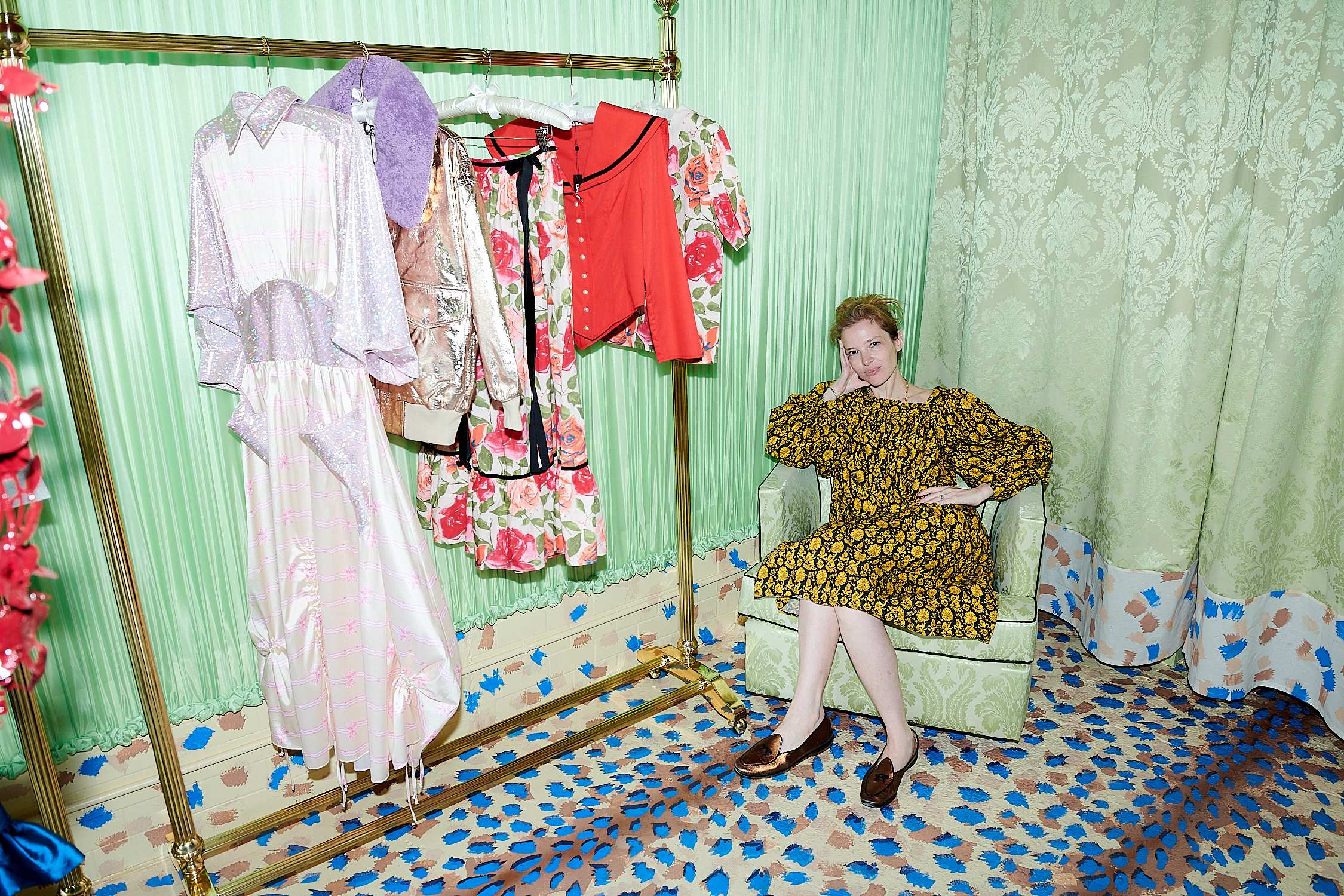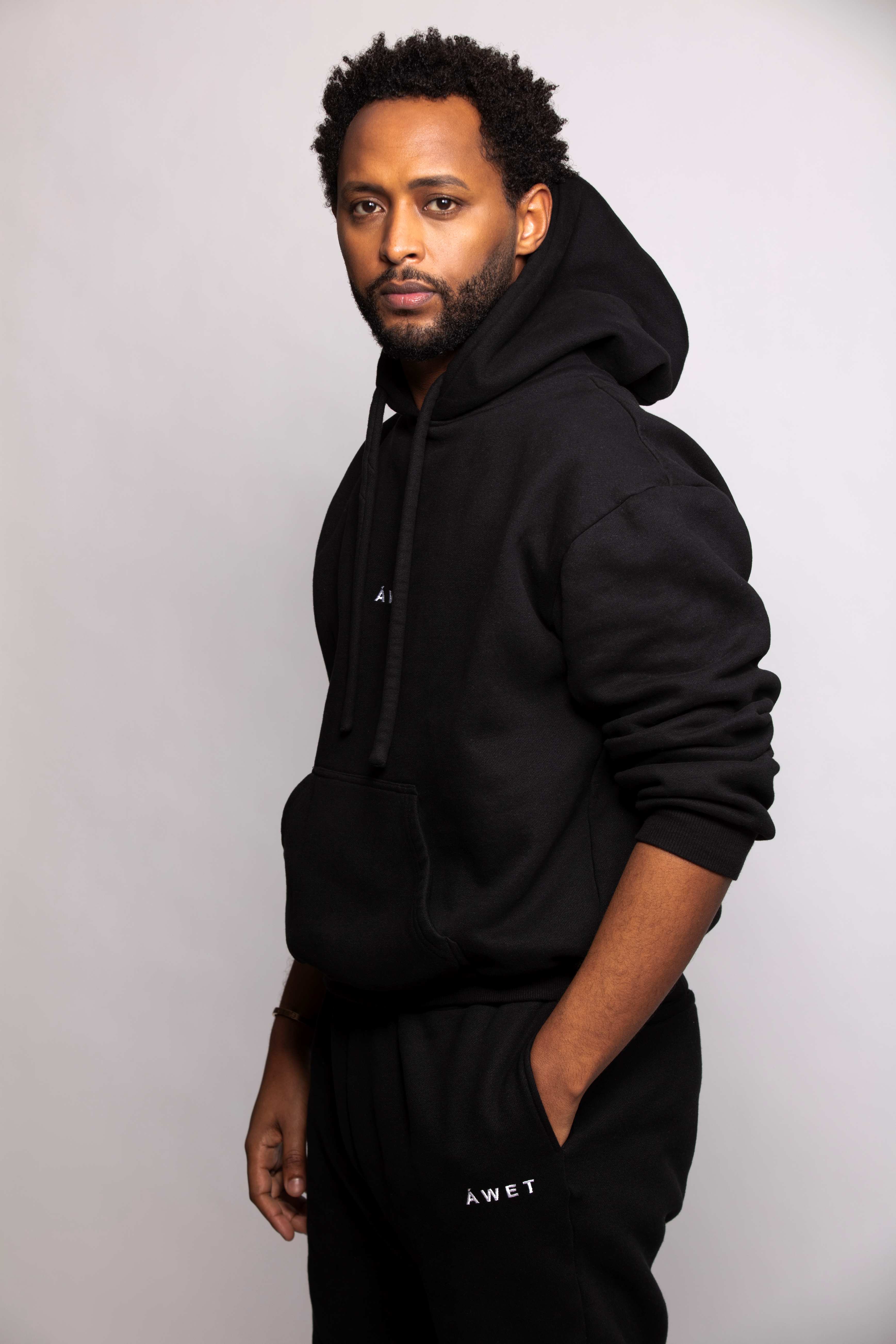Inside Papa Oppong’s Growing Success
March 27, 2024
Cal Mcneil
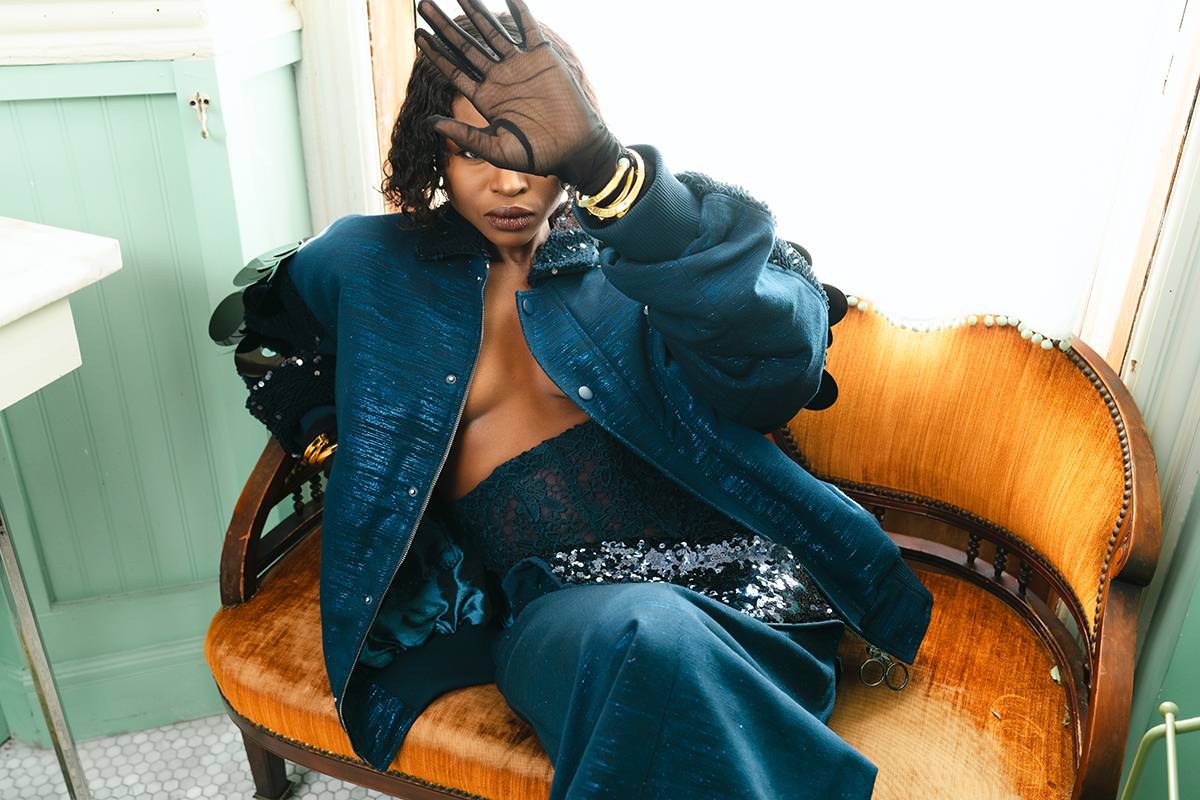

Ghana-born Papa Oppong has had his eyes set on fashion since childhood. To realize the dream, he built a namesake business dedicated to “craft, fantasy, and heritage.”
In the short amount of time since the inception of the Papa Oppong brand, the designer, illustrator, and artist has been recognized in Africa, his home continent, as well as the U.S., where he currently resides and beyond. He has collaborated with CFDA member brands such as Studio189; Forbes featured him as of the “15 Young Africans Rebranding the Continent,” and his work was included in last year’s Brooklyn Museum exhibition, “Africa Fashion.”
As Oppong leaves behind his time as an MFA student at the Fashion Institute of Technology and enters a new stage of business, including the first-ever wholesale collection release and a recent spotlight on “Today with Hoda and Jenna,” we take a peek inside his growing world of creativity and community.
Tell us about the collection you recently launched.
The new collection is called Prologue and it is a capsule collection of 11 styles. It serves as a soft reboot of my brand.
This collection contains a few firsts: it is my first collection since graduating FIT with an MFA in 2021, my first ready-to-wear collection available for sale to consumers, and my first wholesale experience as a deesigner.
Prologue signifies the start of an era. As a storyteller in fashion, I decided last year to compartmentalize all my collections into one book so the collections will follow a systematic order of release as found in a novel. It begins with Prologue, then the next collection will be called Foreword. From there, we move to “A Note From The Designer” and then we begin with the chapters: Chapter 1, Chapter 2, Chapter 3, etc.

For Prologue, my focus was establishing certain key ideas that lay the foundation for possible brand staples. The collection features 11 key pieces that can fit in any modern day, contemporary wardrobe. As part of my commitment to promoting artisanal Ghanaian craft, I worked with local weavers in the northern region of Ghana to create custom Fugu textiles for the collection. These handwoven textiles are considered very luxurious on the continent and to see them used in modern, contemporary silhouettes such as a bomber jacket was one of my main goals.
In this collection, I focused on the sea deity “Mami Wata” as a muse. Although her name may invoke fear and a sense of dread for most, I consider her to be a powerful female spirit and I wanted the clothes in this collection to also invoke a similar aura – I have always wanted the Papa Oppong woman to assume a position of power and authority through her dressing and looking into imagery on Mami Wata really helped me form the collection into what it is now both visually and aesthetically.
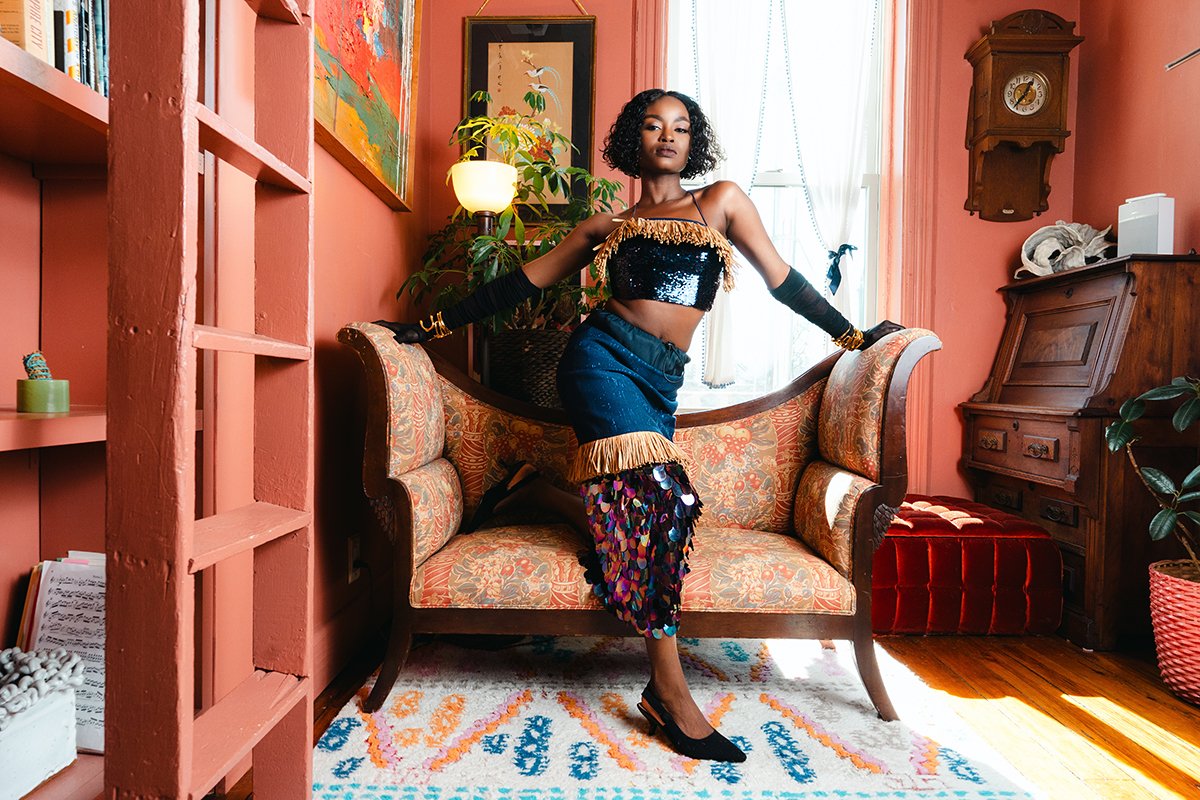
Prologue marks my first time being on a global e-commerce site, Farfetch, and my first retail store, Browns London. To celebrate and honor the women who have helped me on my journey, I named some of the pieces after women in my community. The “Cynthia Petiole Dress,” for example, is named after my mother and the “Edy Petiole Overalls” is aimed after Edineide who was my very first client and has supported me since day one. To see the names of these incredible women cemented in these looks and on such a global stage ties this all in beautifully. Ultimately, Prologue is a proposition of African luxury fashion concepts, cohesively packaged into a story of artisanal craft and the power of womanhood.
How has your upbringing in Ghana informed your designs?
Ghana plays a very big role in my design process. I grew up hearing stories of pre-independence Ghana and stories of my mom and her sister’s childhood by my grandmother and so many different family members. These stories always fascinated me and nudged me to be a bit more curious about Ghanaian traditional culture in general. I remember when I was in middle school and boarding school, I would even join the traditional dance clubs just to be in the mix and to learn more about the different tribes and their practices.
One of the reasons I started my brand Papa Oppong was to be able to turn some of these interesting stories I was told growing up into tangible objects and clothing just made sense. Through the brand, I want to be able to share some of the things I have heard and some of the unique folktales and folklores of my country with the world. When someone purchases a Papa Oppong piece, they are inviting culture, tradition, and heritage into their wardrobe. To me, clothes are a very powerful vehicle for inspiration and education, and I hope my clothes contribute to the ongoing dialogue on the position of African luxury in the fashion industry as a whole.
How important is community to you? And who in your community has helped you progress as a designer and business entrepreneur?
Community really is everything to me. You know the saying “It takes a village?” It truly does. There is no way I could’ve launched “Prologue” without the people that worked tirelessly to put all the pieces together – it’s simply impossible. I am very transparent about my strengths and weaknesses when it comes to my brand and there is no way that I would be where I am at without the kindness and support both from people within my inner circle and strangers who have turned into supporters.
Through the community, I have been able to raise funds for projects, make sales and even found mentors who have gone as far as guiding me through some personal and emotional challenges. I think it’s very easy to forget sometimes that designers are also just regular human beings who deal with their own personal issues like everybody else, so it’s been very helpful having a strong support system to lean on when said challenges creep in. Through community I have found empathy in design.
You were recently featured on the Today Show. What was your design approach as you worked to create custom looks for Hoda Kotb and Jenna Bush Hager?
The Today Show with Hoda and Jenna was an incredible experience. I knew about this opportunity back at the end of summer 2023 by way of the Fashion Institute of Technology and was eagerly looking forward to the main taping in February 2024. When I received the brief to design custom looks for Hoda Kotb and Jenna Bush Hager, I immediately knew the looks had to be culturally and traditionally relevant to my country and my continent. By creating looks that were directly influenced by home, I would be putting not only my brand in front of a world audience but Ghanaian artisanal craft as well.
I decided to use Northern Ghana’s iconic stripped fugu textile to make Hoda and Jenna’s looks to bring this very unique handmade textile to the global stage.
I started the design process by putting down keywords that defined Hoda and Jenna’s personalities. Words like: feminine, alluring, confident were all jotted down under their respective hosts and from there, used these keywords to help create silhouettes. To not stray too far away from what the hosts are used to, I also enlisted the help of images found online of these two personalities at various events over time. I noticed that generally Jenna’s style is more playful and feminine whilst Hoda is more conservative in a very sophisticated manner.
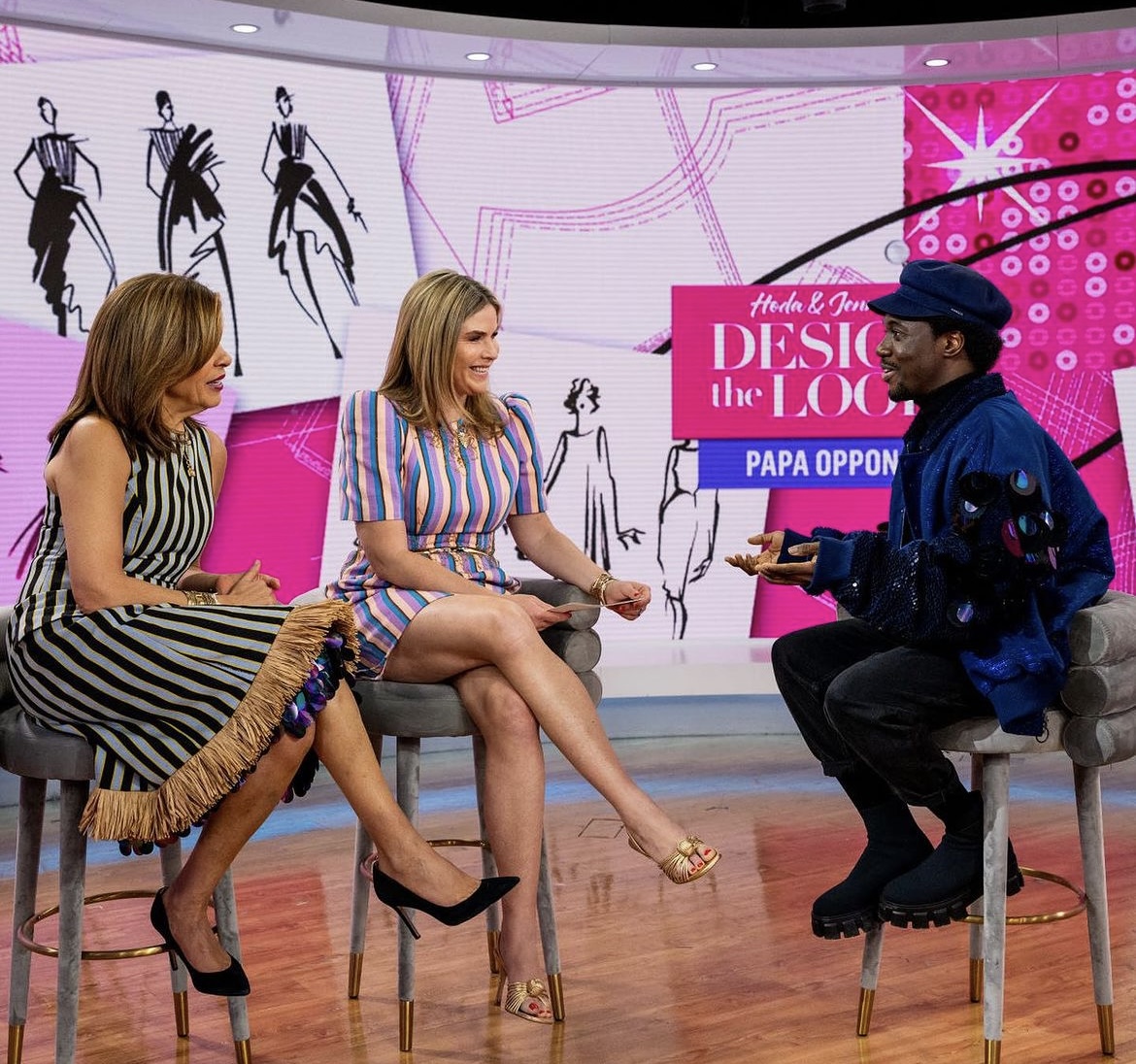
Hoda’s dress was a close-fitting midi-length hourglass shaped, sleeveless dress with a hem finishing of raffia and paillette trimming; a nod to the straw-roof mud huts of Ghanian villages. I chose fugu stripes in the colors: sky blue and black with accents of yellow that invoked a sense of confidence and sophistication.
Jenna’s dress was very much inspired by her bubbly personality. She worked with me to decide on a playful length and loved the idea of a statement short puff sleeve. Her look featured pleats cleverly hidden within the stripes of her pink and blue fugu textile. I hand painted 3D gold glitter color on the neckline and the waistline to create an illusion of embroidered threads – a nod to my collection: “The Boy Likes Ribbons” from 2018.
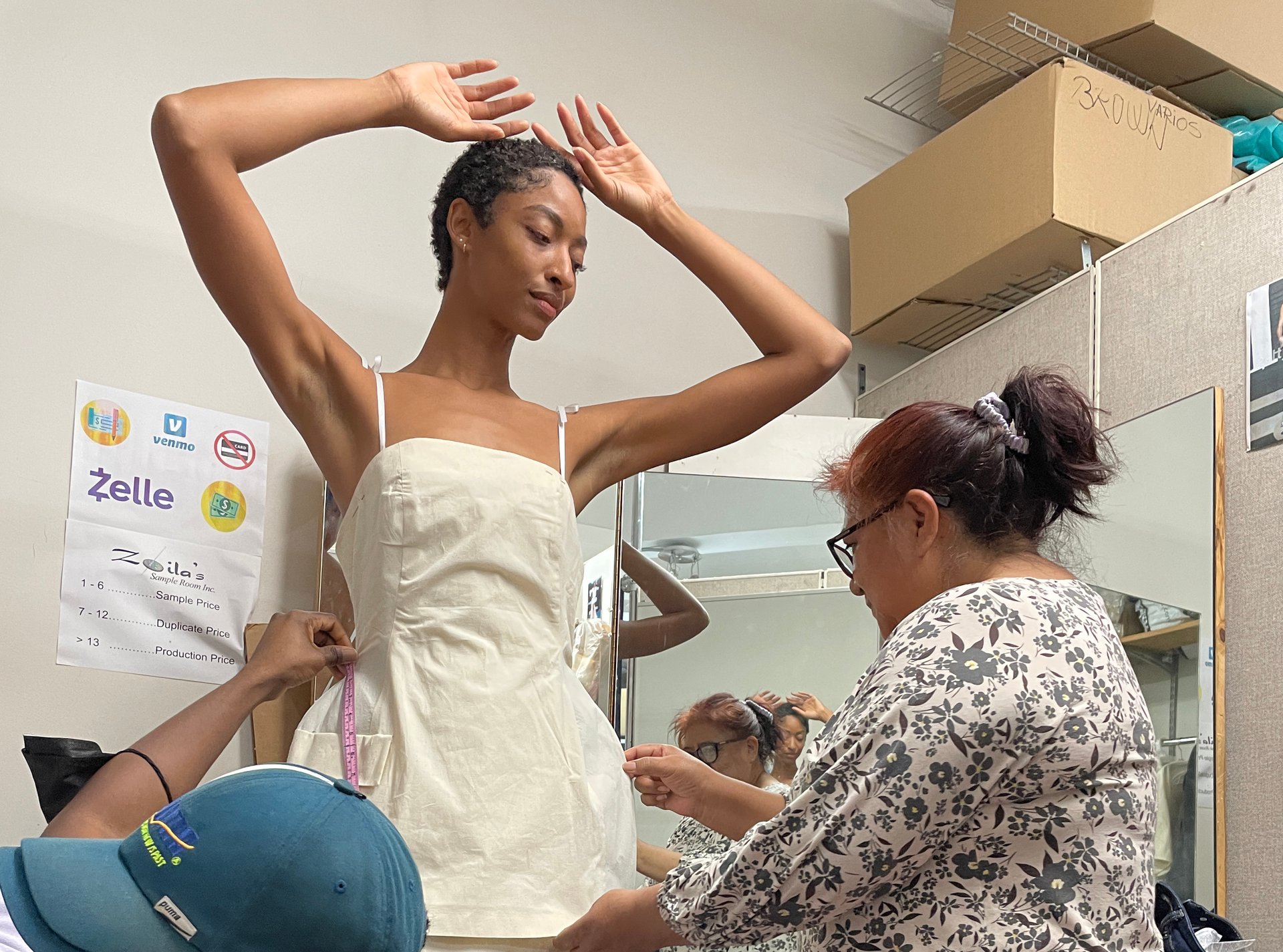
I worked on the custom looks with my favorite sampling studio in the New York City Garment District: Zoila’s Sampling Room. I have known Zoila Cruz for some time, and she is my go-to sample maker in the city. With Zoila, I do not need to say much, once she sees my sketch, she knows exactly what to do and when she found out the pieces are going to be worn on national Tv she was equally excited to work with me on them.
I also worked closely with the today show’s stylist Alex Rozansky to style the looks. If you look closely at Hoda’s look, you will notice she wore a very unique gold pendant. The pendant is in the shape of a comb and is an Adinkra traditional symbol called “Dua Fe” which represents “Beauty” in Ghana. We styled Jenna’s look with a thin metallic gold belt and the prettiest gold heeled sandals. It’s all about the little details, with me.
It was truly an incredible experience. I am glad I was able to tell the story of my journey to America through them and I am very thankful to FIT for continuously providing me with a platform to share my work with the world.
What has been the most difficult area of starting a design business?
There has been many, but the overarching struggle is always with funding…Fashion design is an incredibly expensive business. Everything costs money; textiles, shipping, fittings, patterns, samples – the list goes on and on. So, it is quite intimidating and quite frankly it is the reason why it took so long to get to this point.
In connection to funding another difficulty has been having to wear multiple hats at once because we are not yet at the point where we can fully employ a huge team. This means I am a designer in the label, but I also run all the errands around the city, attend all my fittings, quality control all garments and even tackle some technical design sometimes as well. As you can imagine this means sometimes, I work more than 10-hour days and that is very tough on the body, mind and soul.
I am fortunate to have a very dedicated team. There are three of us and we pack a punch. Between us three, we get a lot done. The team consists of Jennifer Fisher Clay who acts as the president of the brand and Leroy Clay who does all things numbers as the Chief Financial Officer. These are close friends I have known for years who have become family and now business partners and honestly without them we would not be where we are so I’m going to use this opportunity to thank them again for all their hard work and dedication to seeing us succeed!
What do you hope to accomplish over the next five years as you continue to grow your business?
I would most certainly still want to be in business! I think to say that in this day and age, it is a privilege. We live in uncertain times and fashion seems very unnecessary sometimes when you look at the news. So first and foremost, I do hope to still be putting work out that continues to change the perception of what African luxury in fashion looks like.
I would also love to have a Papa Oppong atelier/studio space in New York City where sampling and experimentation could happen -this has always been a major dream of mine and the team and I will continue to work towards making that a reality. We are currently applying for more grants and awards in hopes of making this wish a reality.
Lastly, I would love to be a staple on the New York Fashion Week calendar. I think the more designers that look like me, sound like me, and come from smaller countries like me that are given the opportunity and platform to showcase work like mine, will create more spaces for conversation on diversity and inclusion in fashion.
What does success mean to you in your life?
Success to me is hearing that what I am doing has given someone else the courage and confidence to get up and start their journey as well.
I received an Instagram direct message one time where a young man in Ghana was telling me how he was able to convince his family to allow him study fashion by showing them my work – it is moments like that which make me feel like I am successful. Of course, it’s great to have a thriving business and to be well known for your work but nothing beats directly influencing/touching another person’s life and helping them find their purpose as well.
When I started this journey, my main goal was to use myself as some sort of case study – an experiment if you will, to show what the journey could look like for a young Ghanaian to come into this incredible city and build a luxury brand from scratch. I didn’t have that when I set out on my journey, so I hope I am able to continue leaving breadcrumbs behind on my trail for the next person with a similar path to be able to emulate.
Any advice for designers who are just starting their own exploration in starting a new design business?
Move at a comfortable pace. We all have different journeys and it’s important to focus on the path ahead of you. I know it’s hard to do in this modern day with how saturated we are with information but it’s important to focus on your journey. You don’t need to create a full collection of 50 looks if you cannot afford to. You don’t need to put on an extravagant fashion show that’ll run you into debt if you’re not at that stage yet. My best advice has and always will be to pace yourself, know your strengths and weaknesses and act accordingly. Get creative, improvise if you must and “MAKE. IT. WORK!”
I would also add that it is important to have a group of advisors and mentors who you trust in your corner. It’s a very tough industry to navigate and near impossible to do it solo. So, finding suitable mentors that are compatible with you and your needs (very early on) is important to avoid a lot of the pitfalls and roadblocks that you may encounter.
CAMPAIGN PHOTOS BY SIMI VIJAY / @SIMIVIJAY
